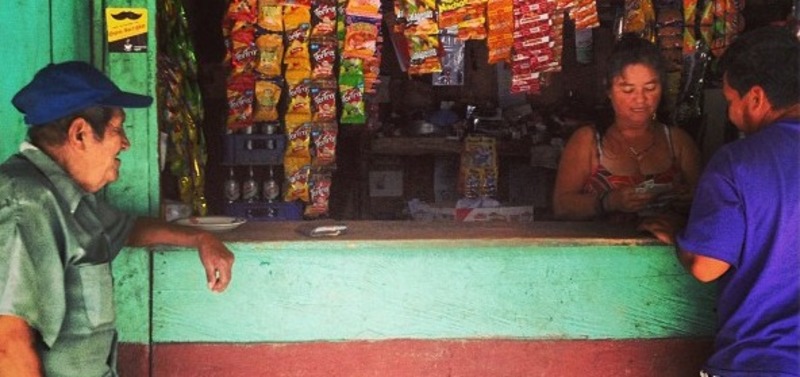A native woman and her small child walk up to a fridge of beverages in a tienda. In a colorful dress she holds her sons’ hand – both are stained with dirt. The mother opens the fridge and asks her son what he wants.
Out of nowhere, a dried-up women flies at the door and shuts it. With nothing but hate in her eyes, she looks down at the mother and son and says, “First you pick what you want, then you open the door.”
My heart sank.
Ever since I was a little kid, I have trembled with indignation at every injustice. Maybe it is because I read too much of Ernesto Guavara’s early writing. Or it could be the fact that I moved from the social-economic dichotomy that is Brazil to Canada’s almost perfect equality, at the age of 10. Whatever it is, this deep feeling has fueled most of my life’s decision.
In high school I made the choice to study journalism because I felt as if it was the perfect weapon in the fight for a more just world. Maybe it was naive of me, but I felt that if I was able to show people the suffering of the forgotten, while giving the voiceless a chance to tell their story, things would one day change.
In University I began to travel. I made a pact to myself that before I did the Euro trip or the Down Under vacation, I would travel the developing world. After the first year of University I backpacked Cuba, Central America, from Guatemala to Panama and Brazil. This trip had a great impact on my person. I learned a lot about the world, but most importantly I began to understand who I was and what my path would be.
It was also in University that I discovered my weapon of choice – the video camera. In my last year of Journalism at Ryerson University in Toronto I shot two international documentaries. The Road to Dago, the story of a group of women in Western Kenya fighting the spread of HIV Aids through education, and Tikabamba, a movie on a group of Canadian University students on a voluntourism trip to the sacred valley of Peru.
Shooting these documentaries made me feel like I was finally doing what I was meant to do in this life.
While reading Tschiffely’s Ride, I began to understand just how powerful horses are while traveling. Moving at 4 kms an hour, these animals give you an insight to peoples lives which no other form of travel does. The horse opens doors. The horse makes brothers out of men from very different realities. The horse is a common language.
A school teacher, Tschiffely became an author after his Long Ride from Argentina to New York. He devoted his life after the trip to writing about human rights issues all over the Americas. His expedition had a great impact on him. He saw injustices he had never even dreamt to be true – the way the Spanish treated the Indigenous peoples, the manner in which the poorest lived, and the rampant corruption throughout the Americas.
The owner of the tienda at the beginning of this story has yet to realize that in this life we are all the same, no matter how much money or possessions one has. No matter the color of skin. No matter what creed or religion one belongs to. We are all born the same way and we all die after our hearts have beat one last time.
My beautiful horses are giving me the opportunity of documenting the lives of people from Canada to Brazil. The raw life that is found on a Tuesday morning as the coffee brews. Rich, poor, Catholic, Native. This trip is allowing me to meet people from all walks of life. What I see is that love is what connects us all. In all of the homes I have entered, I have felt so much love.
My hope is that when this project is done you will see what I see. In Canada, the US, Mexico or Guatemala, the people are good. The kind of folks that will feed a stranger as if he was their own son.
There is still time to build a more just world. A world where children have an opportunity to grow. To learn. To dream.
